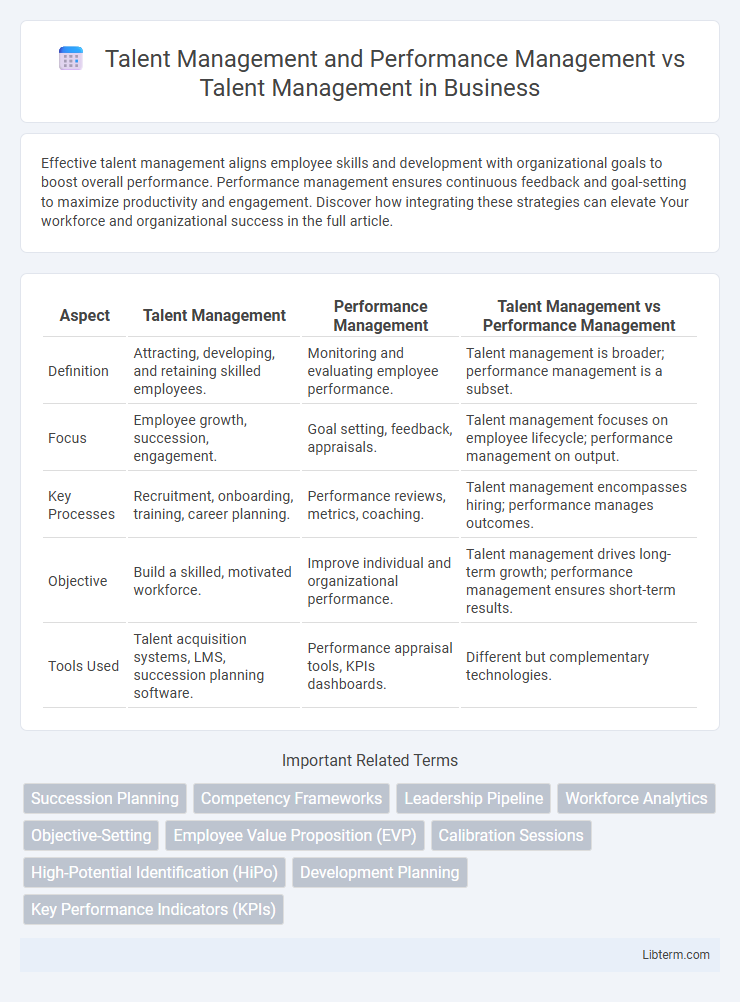Effective talent management aligns employee skills and development with organizational goals to boost overall performance. Performance management ensures continuous feedback and goal-setting to maximize productivity and engagement. Discover how integrating these strategies can elevate Your workforce and organizational success in the full article.
Table of Comparison
| Aspect | Talent Management | Performance Management | Talent Management vs Performance Management |
|---|---|---|---|
| Definition | Attracting, developing, and retaining skilled employees. | Monitoring and evaluating employee performance. | Talent management is broader; performance management is a subset. |
| Focus | Employee growth, succession, engagement. | Goal setting, feedback, appraisals. | Talent management focuses on employee lifecycle; performance management on output. |
| Key Processes | Recruitment, onboarding, training, career planning. | Performance reviews, metrics, coaching. | Talent management encompasses hiring; performance manages outcomes. |
| Objective | Build a skilled, motivated workforce. | Improve individual and organizational performance. | Talent management drives long-term growth; performance management ensures short-term results. |
| Tools Used | Talent acquisition systems, LMS, succession planning software. | Performance appraisal tools, KPIs dashboards. | Different but complementary technologies. |
Introduction to Talent Management
Talent Management encompasses a holistic approach to attracting, developing, and retaining skilled employees to align workforce capabilities with organizational goals. Performance Management is a component within Talent Management focused on evaluating and improving individual employee productivity and outcomes through continuous feedback and goal setting. Understanding Talent Management's broader scope highlights its strategic role beyond performance evaluation, integrating recruitment, succession planning, and employee development to drive long-term business success.
Defining Performance Management
Talent Management encompasses the strategies and processes for attracting, developing, and retaining skilled employees, while Performance Management specifically focuses on evaluating and improving individual employee performance through goal setting, continuous feedback, and appraisals. Defining Performance Management involves systematic efforts to align employee activities with organizational objectives, using metrics such as KPIs, performance reviews, and development plans to optimize workforce productivity. This distinction highlights that Performance Management is a critical component within the broader Talent Management framework, essential for driving employee accountability and organizational success.
Key Components of Talent Management
Talent Management focuses on key components such as talent acquisition, employee development, succession planning, and employee retention to ensure a skilled and motivated workforce. Performance Management, often integrated within Talent Management, centers on setting performance goals, continuous feedback, and appraisals to enhance employee productivity and align with organizational objectives. Effective Talent Management creates a strategic framework for attracting, developing, and retaining talent while Performance Management drives individual performance improvements within that framework.
Core Elements of Performance Management
Talent management and performance management are interconnected yet distinct processes; talent management focuses on recruiting, developing, and retaining skilled employees, while performance management centers on continuous evaluation and improvement of employee performance. Core elements of performance management include goal setting, ongoing feedback, performance appraisals, and employee development plans, which align individual objectives with organizational strategy. Effective performance management enhances workforce productivity and helps identify skill gaps crucial for talent development initiatives.
Talent Management vs Performance Management: A Comparative Overview
Talent management focuses on attracting, developing, and retaining skilled employees to support long-term organizational goals, while performance management emphasizes evaluating and improving employee productivity and outcomes through continuous feedback and appraisals. Talent management integrates workforce planning, succession planning, and learning and development programs to build a robust talent pipeline, whereas performance management centers on setting performance standards, monitoring progress, and aligning individual goals with business objectives. Both processes overlap in their aim to optimize human capital, but talent management adopts a broader, strategic perspective, while performance management targets operational execution and performance enhancement.
Strategic Role of Talent Management in Organizations
Talent Management plays a strategic role in organizations by aligning workforce capabilities with long-term business objectives, ensuring the right talent is identified, developed, and retained to drive competitive advantage. While Performance Management focuses on evaluating and improving employee output through goal setting and feedback, Talent Management encompasses a broader scope, including succession planning, leadership development, and employee engagement to foster organizational growth. Integrating Talent Management strategies enables companies to build a resilient talent pipeline that supports innovation and sustainable success.
How Performance Management Drives Employee Outcomes
Performance management drives employee outcomes by setting clear goals, providing continuous feedback, and enabling data-driven evaluations that enhance individual and organizational performance. Unlike traditional talent management, which focuses on attracting and retaining employees, performance management actively monitors and improves workforce effectiveness through regular appraisals and development plans. This dynamic approach fosters employee engagement, skill growth, and productivity, directly impacting business results and talent retention.
Integration of Talent and Performance Management Processes
Integrating Talent Management and Performance Management processes enhances organizational effectiveness by aligning employee development with business goals. This integration allows continuous feedback, skill assessment, and targeted development plans, fostering talent retention and productivity. Seamless data sharing between these systems provides insights for strategic workforce planning and improves decision-making on promotions, succession, and compensation.
Benefits and Challenges of Aligning Talent and Performance Management
Aligning Talent Management with Performance Management enhances organizational efficiency by ensuring employee development directly supports business objectives, thereby improving retention rates and driving productivity. This integration benefits workforce planning and succession strategies through real-time performance insights but poses challenges such as increased complexity in system implementation and the need for continuous communication to align diverse stakeholder expectations. Organizations must address data integration issues and resistance to change to fully realize the synergy between talent acquisition, development, and performance evaluation processes.
Best Practices for Optimizing Talent and Performance Management Systems
Effective talent management integrates structured performance management systems to align employee goals with organizational objectives, fostering continuous growth and development. Best practices emphasize transparent communication, regular feedback cycles, and data-driven assessments to optimize talent potential and drive measurable performance outcomes. Leveraging technology platforms enhances real-time analytics and personalized development plans, ensuring agile and scalable talent strategies that adapt to evolving business needs.
Talent Management and Performance Management Infographic

 libterm.com
libterm.com